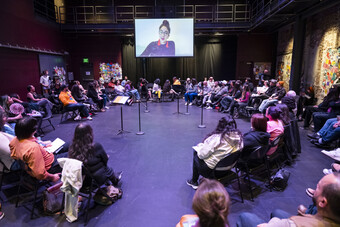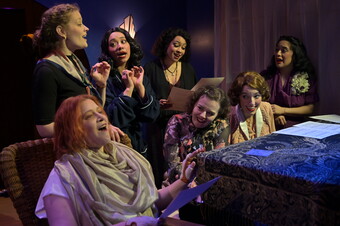Taking the Temperature
Understanding Latinidad
In preparation for the upcoming Latina/o Theatre Commons National Convening, the Steering Committee asked the participants to weigh in on a few questions about the state of Latina/o theater. This is the last of three blogs detailing some of the participant responses.
The subtleties of Latinidad—what does that mean to you? How is it manifested in terms of casting, play selection, playwriting, teaching, providing authenticity in your work? Does your cultural identity impact your ability to work?
“I work in a private university where many of the students come from privilege. I often feel guilt that I'm not in an institution where more of the students look like me. Sometimes I think, well, I may be the first Latina some of these students have come across who wasn't their maid; that's got to be a good thing, I guess.”
“I guess I don't know exactly what Latinidad is. I mean, I look different—that I know. And honestly, that's pretty much it. I don't feel as if I behave differently than anyone else in this world, or that I behave like a ‘Latino’ and do things only Latinos do—I mostly just look different. […] I never thought of myself as Latino—I was just another guy trying to be an artist. You are the one that said I was Latino—the theatre told me that I was Latino.”
“My cultural identity provides me with opportunities to work given my scholarly specialization. I feel it does provide a sense of authenticity or cultural access in my scholarship. At the same time, I am constantly reminded by peers and mentors to not be pigeon-holed as only a Latina scholar, and that I must ‘sell' myself as more than that in order to land a tenure track position.”
“I'm fortunate in that my cultural identity does not impact my ability to work.”
“The field is not yielding the actors I need yet, and I'm wondering why this is so. So they're either not being trained properly or the pool is not diverse enough. For example, if I need a light skinned bilingual actor who can do a believable Northern Mexican accent—the casting pool is limited. If we were doing a play that required a Northern Irish accent there would be loads of actors able to duplicate that accent, because it's being taught in acting programs. But that is not the case with ‘Latino/Hispano’ accents. There is this ‘generic Latino’ that is suggested in schools and it's kind of... useless. (And frankly, offensive.) It's made up. It's a construct of the Taco Bell dog and Scarface, or something—and actual Latinos did neither of those voices, yet it's what a lot of the field accepts. […] I bring this up because I see that it is affecting our ability to tell complicated stories. It's about having a respect for the form, I suppose. We should value the varied dialects and regionalisms of our many countries so that we can serve and honor the work that is being created.”
“Why do I get that look when I say, 'She's Spanish AND blonde.' 'She's Cuban AND has a PhD.’? My work is entirely completely and utterly defined by my cultural identity—even when the play is set in Gary Indiana or about scientific concepts—because my writing is who I am. My cultural identity is a hybrid of many experiences—being Latin is one that is easily identified and marketable (if anyone cares), but I am equally small town, North Face, yuppie yoga mom and also alcoholic euro-trash Ivy League pretender. So, when I want (or the market wants) to exploit one of these personas, fine. But I am many things, and write many things. I'm not confused about it.”
“I do want cultural authenticity in my plays, who doesn't, but also I have to remind myself that this is the theater. This play is not real life; it's a metaphor. And these people on the stage are not really those characters. They're actors, and they come from all over. So, at some point, we have to believe in the function of that metaphor. That's why I think authenticity is a loaded word. Nothing we do, if we are serious about it, is authentic.”
“In terms of my artistic work, I try to be as specific as I can to my Mexican-American origin and my Chicana feminist politic. If I am specific and you are specific, maybe we can get the stories that need to be told to be clear, unique, and illuminating.”
“Being a Latino director has afforded me with some of my best opportunities artistically and professionally. Connecting with the Latino theater community in NYC has provided me with great partnerships and true friendships and collaborations. That said, I've had to fight a sometimes uphill battle against being pigeonholed, and watch as peers (even directors of color that are Black or Asian) sometimes seem to experience greater opportunities.”
“Unless I write my work about me, I never see any breakdowns anywhere that I match. Our current Latino plays often focus on immigrants or the immigrant experience. I was born in America. Or something really fantastical like drugs or crime. But sometimes I just eat a Thai curry, check my email and go to the gym. That's as exciting as my day gets while I look for auditions. Where is that story? Where are the boring brown stories about American-born Latinos who are trapped in limbo between the white world and the immigrant world. We became what people told us to, assimilated. But now, that feels not sexy enough to be Latin. I didn't cross the desert. But I did cross the stage to get two diplomas and that feels wildly dramatic to me. I notice that our Latino writers and directors tend to create and cast brown versions of white structured art. Skinny, pretty, young Latin boy and girls instead of Barbie and Ken. […] The effect of my invisible cultural identity has had the direct result of me creating work that often goes above and beyond to include the Latino voices and faces we never experience in our field.”











Comments
The article is just the start of the conversation—we want to know what you think about this subject, too! HowlRound is a space for knowledge-sharing, and we welcome spirited, thoughtful, and on-topic dialogue. Find our full comments policy here
So glad to come across this.
I've been thinking a lot about this and how writing, "Encanta" intersects with (or not) the things everyone here is talking about.